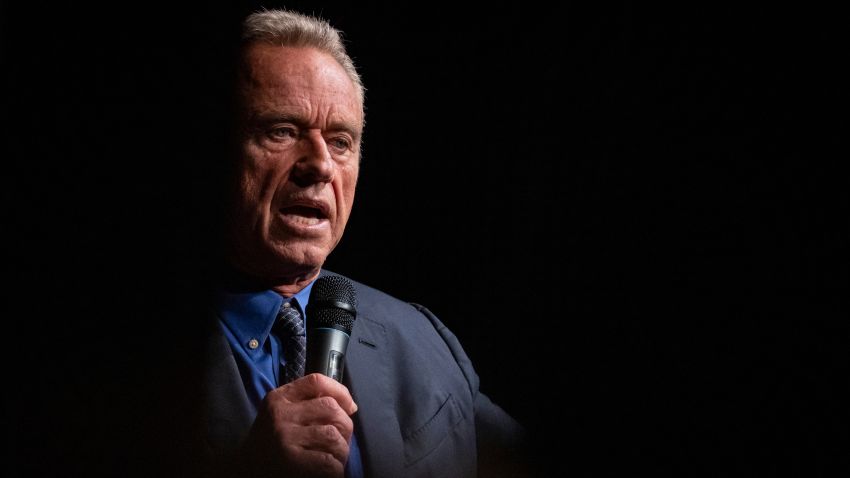There are few things you can be more certain of in life than a Democrat or a Republican winning a US presidential election. We don’t usually do third parties or independents in this country. Chances are Democrat Joe Biden or Republican Donald Trump will be elected a year from now.
But it would be foolish to dismiss what the current polls are telling us: Independent Robert F. Kennedy Jr. is polling higher than any independent or third-party candidate in a generation. He, along with other non-major-party candidates, has a real chance to affect the outcome of the 2024 election.
Take a look at a recent Quinnipiac University poll: Kennedy hit 22% among registered voters. That struck me as very high, so I went into the polling vault.
The last independent presidential candidate to earn over 20% support in a poll within a year of the election was Ross Perot in 1992. He ended up getting 19% of the popular vote.
Perot is a bit of an exception in that independent or third-party candidates usually fade as an election nears. John Anderson was polling above 20% during the 1980 campaign, before pulling in just 7% in November. In 1968, former Alabama Gov. George Wallace topped out at 21% in pre-election polling as a third-party candidate before picking up 14% when the votes were cast.
The amazing thing, though, is that these three have been the only non-major-party candidates in the history of polling to hit more than 20% within a year of the election. Kennedy is now part of this select group.
Moreover, those three prior candidates ended up getting above 5% (if not 10%) in the final outcome.
We don’t know where Kennedy will end up, obviously; however, his numbers in the swing states should be turning heads. According to New York Times/Siena College surveys, Kennedy was in the high teens to upward of 25% in the six closest states that Biden won in 2020 over Trump: Georgia, Arizona, Wisconsin, Pennsylvania, Nevada and Michigan.
The Times/Siena polls were notable, of course, because they sent some Democrats into a tizzy and some Republicans into euphoria earlier this week. Trump came in with a higher share of the vote than Biden in five of these states among registered voters and in four of them among likely voters.
If the final results matched those polls, Trump would win the election.
But when Kennedy was introduced as an option among likely voters, Trump was ahead of Biden in only two states (Georgia and Nevada). His 5-point leads in Arizona and Pennsylvania disappeared into ties. Biden held a well-within-the-margin-of-error edge in Pennsylvania, while the two were tied in Michigan.
Put another way, a clear Trump polling lead became a jumbled mess with no clear favorite to win in the Electoral College thanks to Kennedy. Both Biden (34%) and Trump (36%) were south of 40% in an aggregate across the six states.
The fact that an independent candidate could take such a large chunk of the vote shouldn’t be surprising. Both Biden’s and Trump’s unfavorability ratings were in the high 50s in the Times/Siena poll (and others as well). They’re tied with Democrat Hillary Clinton and Trump in 2016 as the two least liked front-runners for their party’s nomination in polling history.
Given all that, it’s no surprise we’re seeing other independent and third-party candidates jumping or potentially jumping into the 2024 race.
Independent Cornel West got 6% and 4% in the recent Quinnipiac and CNN/SSRS surveys.
Jill Stein announced Thursday she was running for the Green Party nomination in 2024. She got about 1% of the vote nationally in 2016, but notably earned more votes in Michigan, Pennsylvania and Wisconsin than Trump’s winning margins over Clinton in those states.
Also on Thursday, West Virginia Sen. Joe Manchin said he would not run for reelection next year. He was entertaining the idea of running as a third-party candidate earlier this year. Manchin took 10% as a No Labels candidate in an PRRI poll during the summer.
Now, none of these non-major-party candidates are likely to win. That, though, really isn’t the point when talking about them.
They’re worth talking about because they are far more likely than usual to take a large chunk of the vote from the major parties, which a lot of Americans feel disenchanted with. The ultimate winner could come in with well less than a majority.
If political analysts don’t take into account the fact that someone like Kennedy is getting north of 20% in some polls, they may be missing a potential sign of where 2024 is heading.



















